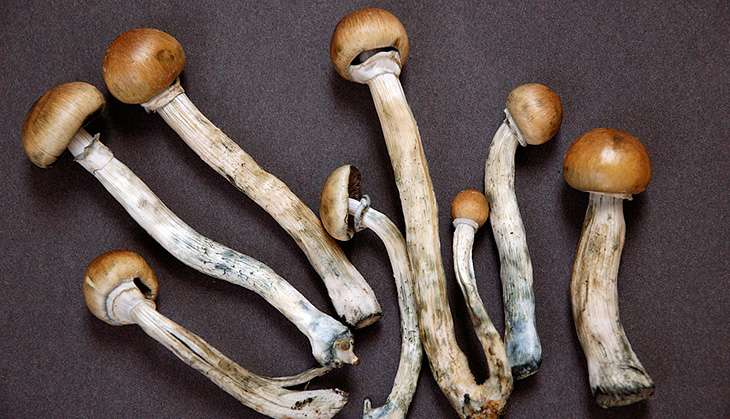Forget happy pills, magic mushrooms can fight severe depression

Researchers have literally tripped upon something that might change the way cancer is dealt with in society. According to two new studies by scientists at New York University and Johns Hopkins, a single dose of psilocybin -- the main psychoactive ingredient in magic mushrooms -- significantly helped cancer patients suffering anxiety and depression. The research has just been published in the Journal of Psychopharmacology.
How the Magic works
In a domestic household setting, two psychiatrists gave volunteers a standard, moderate dose of psilocybin. After a couple of hours psychiatrists walked the participants "through a structured therapy session."
The reaction of participants were recorded immediately after the exercise and once more after six months. The results have led researchers to believe that there might be some good magic after all out there: 80 percent of patients reported heightened levels of optimism and decreased anxiety, especially anxiety related to death. Moreover, some said that the period during which they were under the effect of the mushrooms seemed much more 'meaningful' than the past months. PopularScience quotes a woman, diagnosed with ovarian cancer in 2010: "I visualized my fear as a physical mass in my body, I screamed at it and told it to get the f*ck out, and it was gone. These fear and anxieties were still gone."
Psilocybin, and the other equally potent hallucinogen LSD, when ingested act on tiny brain receptors called 5-HT2A receptors. These are the ones which trigger massive mental transformations which are manifested as euphoria, hallucinations and other sentiments.
CNN quotes the study's lead author, Dr. Stephen Ross, director of substance abuse services and associate professor in the Department of Psychiatry at NYU Langone, saying that by the end of the study, "We found that psilocybin was a rapid, immediately acting anti-anxiety and antidepressant."
Roland Griffiths, a psychiatrist at Johns Hopkins medical school and lead author of the Hopkins study, told Popular Science that, "These results show [psilocybin] can produce deeply meaningful experiences and attribute positive changes in mood and behavior."
However Griffiths, and other researchers also pointed out that the positive effects on the moods of the patients, shouldn't solely be credited to psilocybin. It's a combination of that, a suitable environment and the guided therapy session.
Leor Rossman, a PhD candidate at Imperial College London, who was not involved in the study said that, "The paradigm shift is not just with the drug itself. But it's together with the right environment and having a therapy session accompanying it."
Dr Ross also acknowledged that by the middle of the year into the experiment, after all patients had been administered psilocybin, about 60% to 80% still experienced anti-anxiety benefits: "We're definitely not concluding that one dose cures people forever. It's surprising that it works so long, but unlikely that it works a lifetime."
Dr Ross also said that psilocybin might have side effects that last months because of the brain's neuroplasticity levels - "Likely when symptoms come back, we're going to need models of how to redose and re-treat," he said.
A history of high
Psilocybin as a form of medical treatment isn't as cutting-edge and new as it seems, though. From the 40s till about the 60s, psychedelics were a not-so-uncommon part of psychiatry. Studies were published then too, about the the benefits of the drug on anxiety and depression. But certain legal restrictions of the time, especially in the US, didn't allow much room to be flexible with such research work.
Psilocybin also got caught up in the general backlash against LSD, especially in the backdrop of the Vietnam War and the Haight-Ashbury social revolution. LSD soon was banned, and with it there came restrictions and bans on psilocybin and other psychedelic drugs.
Now, researchers hope that things might change. A part of the abstract sums up the hope the researchers have for the future of this unique method of medication:
"Hopefully, the positive findings that they report will act to spur on other researchers in the field of psychopharmacology, particularly in relation to depression, anxiety and addiction - disorders of enormous personal and social costs, and with many patients who still fail to respond adequately to current treatments, as well as to patients with existential distress."
First published: 3 December 2016, 4:55 IST





![BJP's Kapil Mishra recreates Shankar Mahadevan’s ‘Breathless’ song to highlight Delhi pollution [WATCH] BJP's Kapil Mishra recreates Shankar Mahadevan’s ‘Breathless’ song to highlight Delhi pollution [WATCH]](http://images.catchnews.com/upload/2022/11/03/kapil-mishra_240884_300x172.png)

![Anupam Kher shares pictures of his toned body on 67th birthday [MUST SEE] Anupam Kher shares pictures of his toned body on 67th birthday [MUST SEE]](http://images.catchnews.com/upload/2022/03/07/Anupam_kher_231145_300x172.jpg)


_251372_1280x720.jpg)
_251371_1280x720.jpg)


